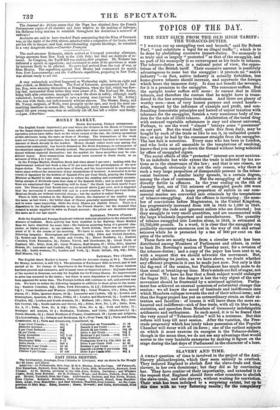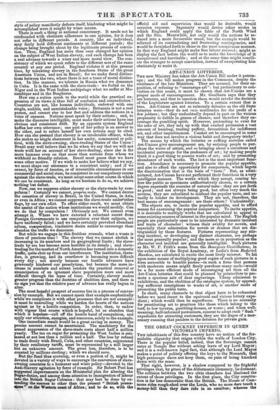SLAVERY AND TIME.
A GREAT question of time is involved in the project of the Anti- Slavery philanthropists, which they seem entirely to overlook. They induced England abolish first the slave-trade and then slavery, in her own dominions; but they did so by convincing her. They have continred their importunity, and extended it to the request that England should force other countries to abolish. the slave-trade, and also slavery, without waiting for conviction. Their wish has been indulged to a surprising extent, but up to this time with no very flattering results; for the compulsory'
style of policy manifestly defeats itself, hindering what might be accomplished were it sought by wiser means.
There is such a thing as national consistency. It needs not be confounded with obstinate adherence to one opinion, for it does not refer to different periods. A country, like an individual, may fairly hold different sentiments at different periods ; the change being brought about by the legitimate process of convic- tion. Thus, England has more than once changed her opinion on the subject of West Indian slavery, and each change has been a real advance towards a wiser and more moral view. The con- sistency of which we speak refers to the different acts of the same country at any one period. England violates it at this present time, by tolerating slavery. in the Southern States of the great American Union, and not in Brazil ; for we make fiscal distinc- tions between the two, where there is not a trace of moral distinc- tion. In like manner, we tolerate in Russia what we denounce in Cuba. It is the same with the slave-trade : we forbid on the Niger and in the West Indian archipelago what we suffer at Mo- zambique and in the Bosphorus.
How can a nation speak to the world while the practical ex- pression of its views is thus full of confusion and contradiction ? Countries are not, like human individuals, endowed with one single, audible, and unmistakeable voice ; Britannia is not a real person, and cannot rise to her feet and address the nations in a voice Of oneness. Nations must speak by their actions ; and, to make the discourse intelligible, must make their actions have one obvious and consistent drift. By an opposite system England baffles her own utterance; • one part of her policy is an answer to the other, and to refute herself her own actions may be cited. How can she pretend that slavery is an intolerable offence, when she makes no single, abatement in her amity, commercial or poli- tical, with the-slave-owning, slave-trading States of the Union ? Brazil may well believe that we lie when we say that we will not trade with her on account of her slave-dealing, since she is far more humane even on that score than nations from whom we withhold no friendly relation. Brazil must guess that we have some other motive. If we wish to make her believe what we say, we must shape our utterance to a consistent unity ; and if we cannot, by force of treaties, or of irresistible circumstances in our commercial and social state, be consistent in our compulsory course against the slave-trade, we must adopt some other course in which we can be consistent. As long as we hesitate to do so, we achieve nothing but defeat. Now, can we suppress either slavery or the slave-trade by com- pulsion ? Certainly we cannot, proprw motu. We cannot decree the cessation of slavery in Brazil, in the United States, in Asia, or even in Africa ; we cannot suppress the slave-trade underrother flags, by our own edict. To effect either result, we must obtain the assent of the nation whose institutions we would modify. Can we do that by compulsion ? Obviously not. We cannot even attempt it. Where we have extorted a reluctant assent from Foreign Governments to use compulsion over their subjects, we have uniformly failed; and we have certainly provoked abundant odium, exasperation, vindictive desire rather to encourage than abandon the traffic we denounce.
But while we enrage in this fruitless crusade, what a waste is there of precious time 1 The slavery that we cannot abolish is increasing in its numbers and its geographical limits ; the slave- trade by sea has become more horrible in its details ; and slave- trading for the market of North America has turned into a domestic traffic, quite shut up from our interference. The institution, there- fore, is growing, and its overthrow is becoming more difficult every day ; not merely because our hostile advances have grievously hindered our proselytism, but because the mere in- crease in numbers and extent renders the practical removal or emancipation of an ignorant slave population more and more difficult through the lapse of time. Certainly, slavery makes greater progress than the doctrine of abolition does, and there is no sign yet that the relative pace of advance has really begun to alter.
The most hopeful prospect of success lies in a process of conver- sion by example. But we cannot speak that example emphatically while we complicate it with other processes that are not example: it must be unavailing while we harden the hearts of the nations against us by a hostile compulsion. In order, then, to endow with vigour that course which is hopeful, let us abandon that which is hopeless—call off the hostile band of compulsion, and apply our attention, energies, and resources, solely to the example. One immediate result would be a great saving in money. The precise amount cannot be ascertained. The machinery for the armed suppression of the slave-trade costs about half a million yearly. The tax on sugar for protecting the West Indies is esti- mated at not less than a million and a half. The loss by refusal to trade freely with Brazil, Cuba, and other countries, augmented by their retaliatory tariffs, must be represented by a still larger but an unknown amount. The gross loss, therefore, is to be counted by millions sterling; which we should save.
But the fund thus accruing, or even a portion of it, might be devoted in a variety of ways to encourage the conversion of slave- owning countries to a humaner and wiser policy—devoted to the Anti-Slavery agitation by force of example. Sir Robert Peel has suggested improvements on the Ministerial plan for altering the Sugar-duties, and among them attention to immigration of labour into the British Sugar Colonies : that may best be done by ex- tending the sources to other than the present " British posses- sions " on the Western coast of Africa ; and to do so, with the
official aid and supervision that would be desirable, would occasion expense. Ingenuity would devise other modes in which England could apply the fable of the North Wind and the Sun. Meanwhile, not only would the nations be se- duced into a more favourable mood, but the example would be relieved of its contradicting and frustrating contingencies, and would be furnished forth to shine in the most conspicuous manner. In that way England might make free labour succeed ; might so display the fact before the world as to make the knowledge of it unequivocal and inevitable ; and at the same time might concili- ate the stranger to accept conviction, instead of exasperating him obstinately to resist it.



























 Previous page
Previous page